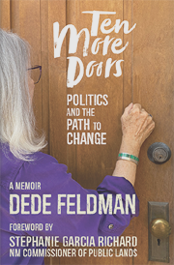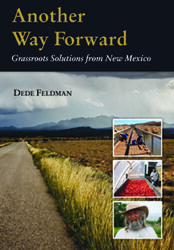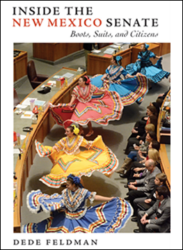![]()
What it Takes to Get Things Done in the Legislature
Sen. Dede Feldman Speech to the Kiwanis June 14, 2004
Thank you David Hsi and an even bigger thanks to the Kiwanis who have done so much through your volunteerism and projects to improve the life of our community here in so many ways. Last night I told my daughter I was to speak to you today and she told me to thank the Kiwanis for buildings at Camp Shaver at YMCA Camp in the Jemez—the nurse’s cottage and one other that were built or sponsored by the Kiwanis back in the 70s or 80s. Your work does not go unnoticed by children who are now becoming adults.
For the past three years, I’ve served as the Chairman of the Senate Public Affairs Committee, which handles bills relating to healthcare, insurance, gambling, alcohol, tobacco, firearms, local government and many other topics. For even more years, I’ve served as the chair of the Health and Human Services Committee where we struggle with some of the serious issues this state faces when it comes to health care, poverty, Medicaid and, seemingly intractable problems like domestic violence, teenage pregnancy, substance abuse and mental illness.
And just to lighten the load—I’m an eight-year veteran of the Water Committee where we seek to balance competing demands for this scarce resource between agriculture, our legal obligation to Texas, the growing needs of our municipalities, and the needs of endangered species and a healthy bosque.
Today I have a very different perspective on the complexity of many of these issues, and the efforts that past legislatures have made to solve these problems. Many of them helpful, some with unintended consequences we are now dealing with. But it is all part of the mix.
Eight years ago I came to the New Mexico Senate as an idealistic freshman, fresh from a hard fought campaign that took me from door-to-door in the near North Valley of Albuquerque–an area renown for its love of politics, its mix of rural and urban lifestyles, its Hispanic and Anglo population, and its strong Democratic performance. And that’s Democratic with a capital D.
And during a campaign… things are simple. There are Democrats and there are Republicans. There are voters and there are non-voters. There is labor and there is management. There are pro-life groups and there are pro-choice groups. And you pick sides. In order to get elected, in order to get the money you need to run the campaign, in order to get the volunteers you pick sides. You simplify. And you magnify the differences between you and your opponent in order to make you look good and your opponent look bad in the eyes of the voters. And the winner takes all. This is the modern American political campaign. And it is coming soon to a TV near you.
But when I arrived in the legislature in 1997 with a list of bills I wanted to pass and a parcel of issues I wanted to advance—many of which were not clearly Democratic or Republican issues, I realized very quickly that the skills I had learned in the campaign were not the ones I needed to get things done in the legislature. I needed to build consensus, reach across the aisle, find common values and interests in order—for example– to reform the way we train kids to get drivers licenses or in order make prescription drugs a little more affordable for seniors. But finding common ground, crafting compromises is mighty difficult when many of the players have just come from a bruising negative campaign in which one candidate accuses the other of beating his wife, falsifying her resume or even eating live children for breakfast.
So, in the absence of guidance from the campaign, what I ended up doing was studying the political process and relying upon my experience from the world of public relations, journalism and teaching—my own background before I began volunteering for the legislature. So… here now to the topic of the day “What it takes to get things done in the legislature”… And I will leave it to you to see if these lessons apply to you in furthering your own projects or succeeding in your own line of work.
First, you must know what it is you want to accomplish… and what it is realistic to expect you can do in a body of 112 diverse individuals representing very different districts, with different histories and outlooks. “Getting things Done” involves selecting what bite of the apple to take first? What battle to pick and when to engage it. When I first arrived in Santa Fe—and to this day—I had big goals— Better Health Care for All New Mexicans…. Campaign Finance Reform…. Water Conservation… Reduced traffic accidents… Consumer Protection. I learned quickly that it takes time, and some progress is better than nothing at all. After seven years of introducing legislation for various types of campaign finance reform, last year I was finally able to pass a bill requiring electronic disclosure of campaign contributions and expenditures so that the public and the press can easily track on the internet who is giving what to whom. And I was finally able to get a pilot project to see whether public financing of campaigns will reduce the influence of big money and special interests. That pilot project for the Public Regulatory Commission will go into effect in two years. But it took me seven years and two governors—and much cajoling of incumbent legislators who are reluctant to change the system that brought them to power. But the larger issue is still out there and it is not going away. But now, with my interim objectives achieved, I’ll keep fighting for more comprehensive reform.
Second, Know the Process. In my case, that’s the legislative process—where it takes very little to kill a bill and a whole lot to pass one. And where the influence of leadership and political parties are very important. Now, here’s what it actually takes to pass a bill—not just a majority on the floor of the senate where it takes 22 votes and a majority on the floor of the House where it takes 36 votes—No, that’s just a small part of it. It also takes a majority in every committee to which the bill is referred in both the House and the Senate, which means that as few as three votes may kill it in almost any committee, when there is not full attendance. Meanwhile, the clock is ticking and, with too many committee referrals, time could run out. The session could end. And of course, even if a bill does pass both bodies unanimously, it could be vetoed by the Governor.
Third lesson: You must Do your homework— and know the issues inside and out…which frankly is impossible when 2000 bills come before you each session. So you must specialize in a few issues and learn them well. I’ve tried to do that with Medicaid, with some aspects of water policy and a couple of other issues. Legislative staff can help you with research— you can collect information about what they do in other states or from national organizations– but that’s not the only research you need. As they say in the PR business, you need market research about what your target audience thinks about your proposal. And your target audience is 111 volatile, distracted, driven individuals—namely, your fellow legislators, each of whom has their own agenda, their own constituents and their own beliefs.
What you need is information on how each legislator feels about the issue going into the session, and how his or her constituents feel about it. Sometimes you can find that information from statements made during the campaigns, on candidate surveys done by various groups, from allies in public, or even special interest groups. Polling data about how the public feels about taxes on alcohol, closing drive-up windows, or other issues is also important, especially if you want to make reforms that go against the grain. The best source of this information, of course, is to talk to your fellow legislators, find out what they’re willing to go along with, what they absolutely hate, and what common values you might share. Don’t make assumptions about who is for you and who is against you—find out for sure.
Fourth lesson: Build a Coalition, a network of people inside and outside the legislature who want to advance your bill who will be willing to serve as spokespeople, testify at committees, tell stories, contact other legislators and network with other supporters who might be constituents of opponents or those on the fence. Ideally, This should start way before the legislative session—and include as many unlikely allies as possible. In 1999, when we were trying to pass the Graduated Drivers License Bill… for example, our coalition included out-of-state traffic safety experts, the American Automobile Association, Insurance Agents, children’s’ advocates, victims of accidents involving young drivers, even the Beer Institute– not one of my usual allies. Our coalition included Republicans and Democrats. We tried to work out the kinks of how this would be financed and administered with the affected departments in advance— this is very important… or else you risk a Governor’s veto… in our case however, there was plenty of resistance from the administration who said this would cost too much and be impossible to operate. But we overcame that barrier with overwhelming grassroots support from parents, PTAs, and yes, even some older teenagers who saw the need for something like this.
Fifth, Communicate Clearly and Use the Media to Your Advantage…I come from a background of journalism. My father was a newspaper editor and I worked as a reporter and freelance writer for many years. And I believe that there’s no substitute for good, clear, brief written materials to make your case, not only to your fellow legislators, but to keep your network informed and to be used as the basis of news releases, op eds and editorial board conferences. Remember that the media can be your friend, as well as your enemy.
We kept the need for a better system of training young drivers in the news for several months before and after the 1999 session. We did this through endless news releases, victim’s stories, and letters to the editor in almost every paper in the state. Of course it helped that these accidents keep occurring… there was a very tragic one in Moriarity right before the session started. The result was constant TV coverage of the bill, and editorial endorsements from every newspaper in the state and hearing from the newspaper back home makes a difference to legislators and—what a surprise—even the Governor reads the newspaper and watches TV. And if they happened to miss the story, we made sure that they got a copy of every one.
Sixth, You Must Tell the Truth and not deceive your fellow legislators.You might be able to trick them into voting for your bill once, but your credibility will be destroyed forever if you overplay your case. You’ve got to accept responsibility for any mistakes in your materials or testimony and you’ve got to accept that not everyone will agree with you and make the best of it because remember– and this is
Lesson Number Seven: There are no permanent allies or permanent enemies in the legislature, or in life. Practically every bill that goes through the legislature has a different coalition of supporters and opponents based not just on party affiliation, or the Governor’s agenda, but also on the divide between rural and urban interests, between men and women, young and old, Native American, Hispanic and Anglo constituencies. It’s important to REMEMBER THAT TODAY’S ENEMY MAY BE TOMORROW’S ALLY BECAUSE THERE’S ALWAYS ANOTHER DAY. THAT’S WHAT KEEPS THE MOTOR RUNNING, AND THAT’S WHAT KEEPS THE MEMBERS CIVILIZED WHILE CRAMPED IN SMALL COMMITTEE ROOMS WITH TOO MUCH INFORMATION TOO LITTLE TIME AND TOO LITTLE SLEEP.
Eighth, Try to rise above taking credit for your bill, your accomplishment. Again this is something diametrically opposed to what you must do to win a campaign. But taking credit is not necessarily what you need to do to get a bill passed or a project completed successfully. Everything in the legislature or the city council or county commission is a group project and the credit—as well as the work– must be shared. Every project that is funded by the legislature is done so with taxpayer funds, and so it is the public and not the politicians who deserve the credit. I forget who it was that said one’s ability to get things done exists in inverse proportion to one’s desire to take credit. I believe this is very true. And the allies you earn by being humble may be more lasting than those you win by being the loudest.
Ninth, Learn from your Mistakes and Be Patient… One of the things that I’ve found out the hard way is that the wheels of change in government move very slowly… but that doesn’t mean you should give up. Sometimes your bill doesn’t pass, your coalition falls apart and the media turns against you. You alienate people unnecessarily and you make mistakes. I was devastated my first session when the bill I wanted most, and which meant most to my district—was vetoed by the Governor, even though I had obtained private funding to operate it. That bill would have created a Bosque Council to coordinate the management of a flammable, fragile decaying cottonwood forest along the Rio Grande that spans three counties and lies within the jurisdiction of many, many governmental agencies.
But things work out. The next year the Governor created a Bosque Consortium by executive order that did exactly what I had wanted. Likewise, my drive to get a home-visiting program for struggling young families with a new baby went down in flames for three years in a row either through vetoes or lack of funding. But guess what? Home visiting is now a pilot project being operated by the Children Youth and Families Department. Somebody, somewhere was listening to all those years of testimony during this long educational experience we call the New Mexico legislature.
Finally, with a sigh of relief… the most important rule of all. Flexibility. The legislative process is often a long and winding road where what you get at the end of the day is not what you started with. There are amendments, there are changes, and there are substitutions and new titles. The people who put your law into effect once it is enacted, tend to administer it differently than you expected. For better or worse…They have a different take on it. Through it all, as someone once said, it’s good to be like a tree, bending with the wind. Because, after all, he who is not flexible is destined to be bent out of shape.
Thanks so much for your patience, and I would welcome any questions or comments.





